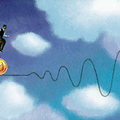Digital campaigning may help shape 2008
 | |
IT HAS been called the YouTube election. America’s 2008 presidential campaign may be remembered as much for the candidates’ frantic activity on the internet as for their stump speeches and television spots. Pundits, inevitably, are talking of the dawn of a new era—or, more precisely, of the maturing of campaign politics on the internet.
The latest splash was a video made by the campaign for Hillary Clinton. Released on her website and widely watched on a video-sharing site YouTube, it was a creative hit. Mrs Clinton and her would-be First Gentleman sit in a diner, discussing which song she will choose for her campaign theme. They ponder the selections in their table-top jukebox. Finally, just before they make their choice, the screen goes black. It was a clever parody of the recent final episode of cable television’s biggest hit, “The Sopranos”. Viewers then had to go to Mrs Clinton’s campaign website to find out which song the Clintons—encouarged by voters on her website—finally chose. Regrettably, it is “You and I”, by Celine Dion, a Canadian singer.
The previous excited buzz was for an ad for Mrs Clinton’s rival, Barack Obama. It was produced, as never before possible, by someone not affiliated with Mr Obama’s campaign, and yet it reached millions of viewers over the internet. Again this was a parody—it directly ripped off a 1984 Apple advert that portrayed IBM as Big Brother, with Mrs Clinton standing in for Big Brother on this occasion—and yet it has been hailed as a creative masterstroke.
It is unclear how much impact such videos will have on voters, but YouTube and the like are changing campaigns in significant ways. A public mistake, even in the middle of nowhere, now imposes a greater cost. Candidates are under intense scrutiny. George Allen, a Republican who ran for the Senate in Virginia last year, learned that to his cost when he called a rival campaign’s worker, who was Indian-American, macaca. His use of an apparent racial slur caused a furore. His opponent, Jim Webb, who had been trailing in the polls, won a close election and the Democrats now control the Senate by a 51-49 margin. In a previous election Mr Allen’s comment might have been missed, but in 2006 the young staffer who worked for Mr Webb had taken to following the Republican and filming him, probably looking for precisely such a slip-up to post on YouTube.
Internet videos are not the only form of new-wave campaigning. The 2004 election saw the advent of serious online fundraising. Howard Dean, a Democrat, was particularly successful. This year all of the candidates are making it a big part of their strategies. Mr Obama’s success at raising more money online, from a larger number of donors, than Mrs Clinton has been widely touted as a sign of his campaign’s greater verve.
Times have already changed since the 2004 presidential election. In that year, bloggers wrote about the presidential debates in real-time. In 2008, voters will be able, through YouTube, to send in video-recorded questions to the debate’s moderators. Last time around campaigns introduced stodgy blogs, written by lowly campaign workers, touting their man’s latest speech here or there. This time, well-known bloggers are being brought into campaigns. And the five sons of Mitt Romney, a Republican top-tier runner, have an enthusiastic group blog. Campaigns are also more interesting these days. The droning, top-down television ads touting a candidate’s virtues and his rival’s vices are now supplemented by far more creative message-making.
Assessing the impact of all this is tricky. One way of judging whether the videos on YouTube have an influence is to see whether, and when, television stations start broadcasting them too. Those who actively use the internet may also become particularly vulnerable to it. Mr Dean used online campaigning to make himself a front-runner in opinion polls and in fundraising, but he won only a single state primary, his home state of Vermont. The internet also helped to hasten his demise, after his famous post-speech shriek was widely mocked online.
This year Mr Obama seems to have more internet buzz, for example claiming more (possibly, these things are hard to compare) “friends” on MySpace than does Mrs Clinton. But MySpace friends do not equal votes. Young users of new technology are not as important as the dedicated and capable “ground troops” in a campaign. The latter come from unions, religious groups and other traditionally organised blocks. Once again, Mr Dean’s story is illustrative—thousands of his enthusiastic workers descended upon Iowa for that state’s early Democratic caucus. But this much-touted “perfect storm” of volunteers, mostly non-Iowan, failed him. Name recognition, money and old-fashioned organisation are virtues that no amount of net savvy can replace. Mr Dean finished a distant third in Iowa, and never recovered.




